While Haji Ali simmers over equal praying rights, women quietly nurture their alliance with other dargahs, some tailored to rid their woes
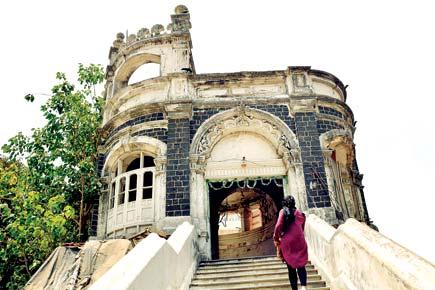
A surprise greets you when you walk up a steep, not-very-wide flight of stairs to the Ma Haji Ani Dargah. Across a carpeted terrace is the entry to the dargah, through which both men and women can enter.
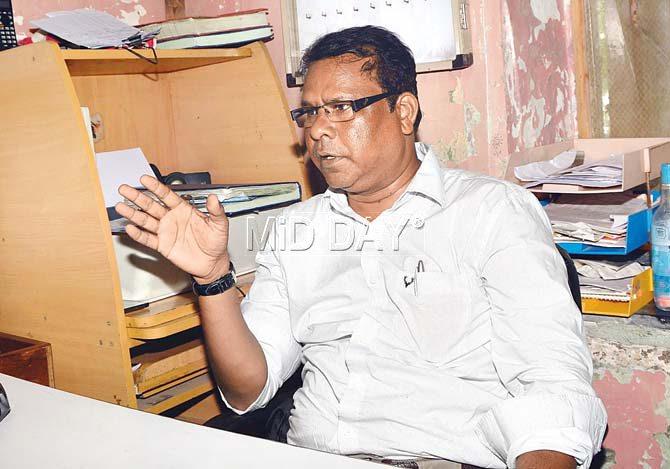
At the Ma Haji Ani Dargah, built in 1908 by Haji Ismail Hasham, women and men share equal rights. Pics/Sayyed Sameer Abedi
ADVERTISEMENT
This is the mausoleum of a woman very dear to Khwaja Haji Ali, whose famed and now controversial tomb sits across the sea from this one on Worli Seaface. The caretaker Zahir Shail says some legends say it belongs to his mother, others believe it is his sister. He isn't sure which and asks us to "check the Internet".
What Shail does share is that, unlike the more famous dargah, this one is an equal space shared by men and women. Inside, there are no barricades that prevent either gender from touching the mazhar.
"It's a woman's mazhar so there's no question of not allowing women," says Shail. Built in 1908 as a token of devotion by Haji Ismail Hasham, whose family-owned Sir Yusuf Mohammed Trust now runs it, sees approximately 250 devotees every day, which rises to 500 during Thursdays, Fridays and Sundays.
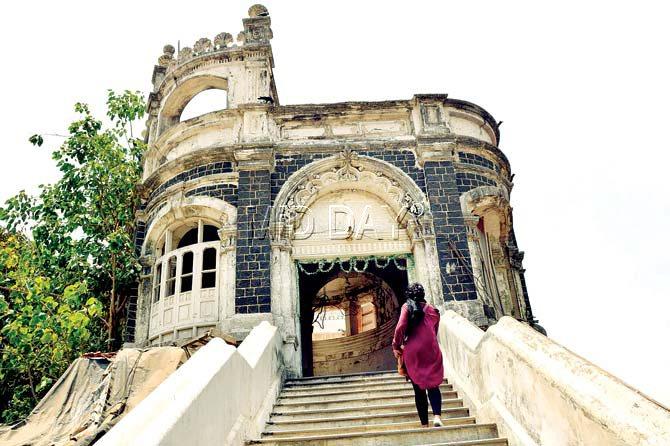
All are allowed to touch the mazhar, says its caretaker Zahir Shai
At Haji Ali, the average daily rush is an estimated 10,000 to 15,000 thousand, which doubles during Thursdays, Fridays and Sundays. The numbers, are in fact, one of the reasons that Haji Ali trustees have used to support the restriction of women in the sanctum sanctorum, now a subject of raging debate.
On Thursday, rights activist Trupti Desai of the Bhumata Brigade tried to enter the dargah after successfully campaigning for entry of women to the Shani Shingnapur temple in Maharashtra last month. But the chaos between pro and anti groups foiled her attempt to enter.
In 2011, Haji Ali's trustees restricted women's entry into the sanctum sanctorum — a move which was challenged in the Bombay High Court. Historical rights to graves The trustees had earlier told the court that entry of women in close proximity to the grave of a male Muslim saint is considered a grievous sin in Islam.
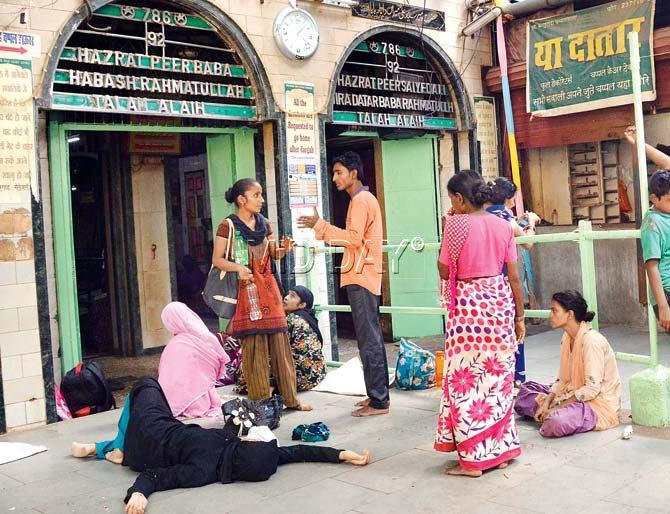
Reay Road's Mira Datar Dargah is said to be the baithak of Hazrat Sayid Ali Mira Datar, whose dargah at Unnava in Gujarat is far more famous. Devotees often come and spend the day here, getting food from the benevolent
It's a claim that Dr Zeenat Shaukat Ali, former professor of Islamic Studies at St Xavier's College and currently Director of the Wisdom Foundation (a global secular, democratic peace initiative), says, is misguided. The Quran mentions the Prophet's daughter Fatema as visiting her granduncle's grave once a week, says Shaukat Ali. The Prophet's grave too, adds Ali, was built in his home which he shared with his wife Ayesha. "So, during her life, Ayesha was living next to the grave."
In fact, in other parts of the world, certain mosques too are open to women, says Delhi-based writer Sadia Dehlvi, who is author of the 2012 title, The Sufi Courtyard: Dargahs of Delhi. "It is not mandatory for women to go to the mosque and thank God for that — will they run their homes or run to the mosque?" Most mosques outside India, she adds, have separate chambers for women to pray and a separate entrance too. In the subcontinent, it hasn't been a tradition, but there is no bar against women.
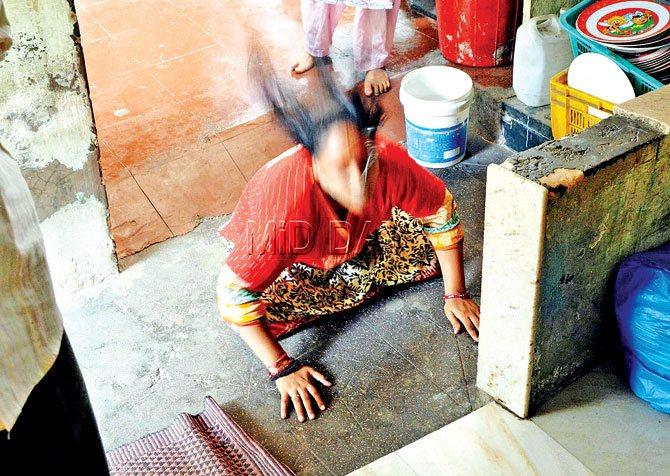
A woman in trance at the Hussain Tekri Imamwada. Its caretaker Rizvi says there's nothing to be afraid of as those "who bear goodwill will come to no harm"
A sisterhood of strangers
Elsewhere in Mumbai, when one asks about dargahs frequented by women besides Ma Haji Ani — where a stand stacked with bangles represents prayers for marriage and children — among the first names to be shared is the Mira Datar Dargah.
In a crowded lane at Reay Road, lined with dhoop and dhaga sellers, the over 300-year-old dargah is a legend unto itself with stories of faith healing. It's more of a baithak and doesn't have a grave, and in many senses is a 'branch' of the more famed Hazrat Sayid Ali Mira Datar Dargah at Unnava in Gujarat.
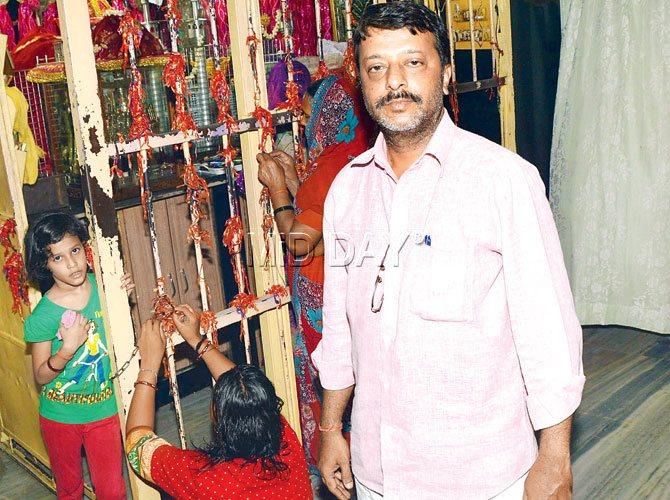
Sayyed Saleem Rizvi, the current caretaker of the Hussain Tekri Imamwada, near Vakola masjid, says the imamwada has been in the family home forever. It was made accessible to the public 30 years ago. He admits he sees more women than men
Dehlvi's words come true here. She says that within Islamic society, dargahs hold a unique position as they have developed as a participatory space for men, women and children across all faiths and classes. Mosques, meant strictly for prayer, are not places one can sit around in.
As you enter the dargah, there is a division of spaces for men and women to sit. We sit down to speak to the women and within minutes, a sisterhood builds.
Shaheen Qureshi, a regular for 35 years, guides us to Anusuya Siddhu Malusare, who estimates her age to be 80. She started coming to the dargah, famed for the daily loban and nagada which help the affected get rid of evil spirits, to cure her of the pain in her limbs.
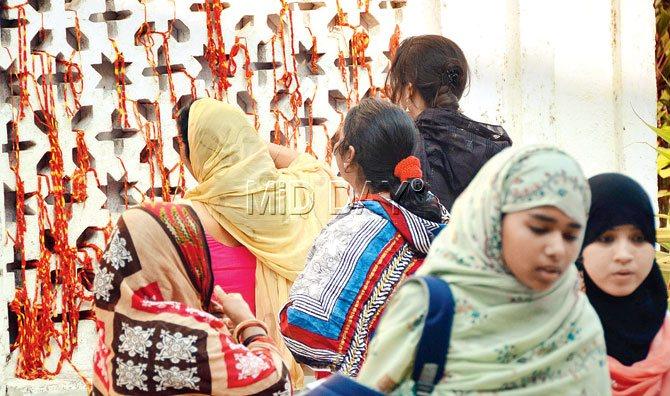
In 2011, Haji Ali's trustees restricted women’s entry into the sanctum sanctorum - a move which was challenged in the Bombay High Court
Visits to doctors, she insists, don't help. "The tests don't show anything," pitches in Radha, a young Dombivli resident sitting near us. She suffered from regular bouts of unconsciousness which, she says, remained undiagnosed for most of her life. Believing that it was the work of an evil spirit, Radha started coming to the dargah and felt better after regular hajiris (when in the presence of the baba, the evil spirit is made to appear). Mira Datar Baba whose dargah it is, chime in the three women, "daant ke neeche se shaitan ko chabaate hain".
Here, as in Haji Ali, women are not allowed into the sanctum sanctorum. The rest of the dargah is open to all. But, ask anyone and they will say it is women who are affected more.
Family that takes care
Sayyed Saleem Rizvi, the current caretaker of the Hussain Tekri Imamwada, near Vakola masjid, proffers a reason: "Often, the spirits affect the house, which women have a direct connect with. Also, women are likely to come in the presence of the Lord more easily than men, who may have to go to work."
As we sit on a Thursday morning in front of the imamwada at Rizvi's home, a woman standing next to us is in a state of trance. "Nahin sataaoonga… itni taaqat naahin hai," she utters on repeat, obviously taking on the male gender. Rizvi is unfazed. "There's nothing to be scared of. This is God's place. No harm will come to those who bear goodwill," he says.
His family has been living in the house since before Independence. "We have had the imamwada — essentially a private praying space — forever. However, it was not always open to public. Our family would visit the Hussain tekri at Ratlam in Madhya Pradesh on an annual visit. Once, during loban there, it came to our mind that we should open it to everyone," he says. That was around 30 years ago. Miracles started occurring almost immediately.
Ramesh Patel, a Vakola resident, who also pitches in with the caretaking of the imamwada, says when he came here the first time, three cloves ejected out of his foot; the sign of an evil presence. The woman in trance beats her head on the floor and sometimes, stops to slaps herself. She doesn't mind us interrupting her routine when we ask her name. "Reena," she smiles. Many women, tired from the hajiri, sit or sprawl in the open area outside the home. "They leave by night. The family needs some time off, after all," says Patel.
Common restrictions
Here, like elsewhere, it's advised that women stay away during their menstruation cycle. But the restriction, says Ali, is not only for women. "Islam lays great stress on hygiene. So, anytime there's any emission from the body, you are required to clean yourself and then go for prayers." Both Dehlvi and Ali stress that there are certain spaces where women are allowed and men aren't. One example is the Khwaja Qutub Dargah in Delhi.
Here, in the inside chamber, women are not allowed. However, inside the complex lies a smaller dargah of Khwaja Qutbuddin Bakhtiar Kaki's wife and wet nurse, called the Dai Sahiba Dargah, where men are not allowed. Gender politics is not restricted to only women, it seems. Equality might be an aim for both Desai and Haji Ali Trustees.
 Subscribe today by clicking the link and stay updated with the latest news!" Click here!
Subscribe today by clicking the link and stay updated with the latest news!" Click here!







